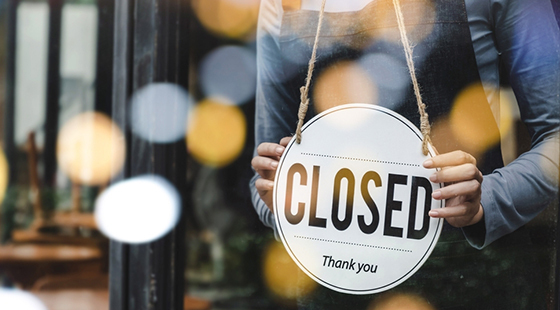How to… throw someone out
Everyone has to deal with the disrespectful diner, the drunk wedding guest or the fighting couple, but at which point do you draw the line and kick them out? David Harris talks tactics
The ejection of customers in restaurants or hotels happens for a range of reasons, of which alcohol is the most obvious. Sometimes it is alcohol combined with emotion that is the issue, says Peter Brent, director at the family-owned Saunton Sands in north Devon, where two couples had to be separated on the dancefloor at New Year. They were separated and taken off to different parts of the hotel to calm down, says Peter, but when it became obvious that this wasnât going to happen, one of the couples was asked to leave and given a room at Saunton Sandsâ sister hotel in Barnstaple.
This seems like an elegant solution to a difficult situation and surely one tactic that deserves a commendation for (minor) crisis management. Brent estimates that during his 40 years at Saunton he has thrown out an average of just one guest a year.
Weddings can get emotional, too. Alasdair Elwick, now general manager at the Samling hotel in the Lake District, remembers some particularly fraught occasions in his previous role as operations manager at Seaham Hall in Durham. He says: âWeddings seem to bring out the worst in people. On one occasion we had to call the police because it had got totally out of hand.â
Others donât even need the excuse of a wedding. Alex Scrivenor, proprietor of the Crags Hotel in Callander in Scotland, had some difficult guests on Valentineâs Day in 2014, who not only became drunk and upset other guests in the bar, but when Scrivenor asked them to stop, they kicked a hole in the wall of their bedroom. The police were called and the guests were removed.Â
To add insult to injury, they then left an online review where they described their stay as âthe worst experience everâ. Scrivenorâs response on TripAdvisor was memorable: âI will remember Valentineâs as the miserable day that I had the misfortune to meet you,â he wrote, adding that âthe 16 February will now be called âHatchet Sundayâ in memory of the review you left us.â
Banned behaviour
Drink and oafish behaviour are not the only reasons for guest ejections. Some guests simply do not want to follow the rules that establishments create. A ban on mobile phones is a typical example.Â
At Auradaze, a Japanese restaurant in Leamington Spa, proprietor Darren Yates, who learned his craft in Japan and has cooked everywhere from Bournemouth to Bora Bora (the best fish in the world, he says) decided on opening two years ago that he didnât want mobile phones in his restaurant.
He says: âWe are very small â" just a counter and 12 seats â" so I didnât want the place dominated by people on their phones. We just have a notice on the door saying that, with great respect, we are a mobile-free zone.
âIf people do use them I ask them not to and, on a couple of occasions, I have had to ask people to leave. But most are reasonable about it and we obviously understand there are exceptions. The other night we had three surgeons in from the local hospital with pagers, which is no problem.â
On other occasions, a proprietor of a restaurant simply takes offence at something a guest does. Doubtless these stories can sometimes be exaggerated â" has anyone truly been ejected for asking for salt and upsetting the chef? But there are incidents.
Marco Pierre White, for example, once threw out food critic Francis Bown. When Pierre White was running Harveyâs in Wandsworth as the young star of the London culinary scene in the 1990s, Bown corrected the French on the pudding menu, which he recalls âwas full of schoolboy howlersâ.
This did not go down well. Bown recalls that the maitre dâ went away and returned to say: âThe chef-proprietor wishes to see you outsideâ.
Bownâs response was to ask Pierre White to come to the table if he wished to speak to him. The exchange was short and sharp:
Pierre White: âWhatâs your trouble?â
Bown: âNo trouble at all.â
Pierre White: âWell, f*** off.â
And with that the table was cleared and Bown and his guest were told to leave, which they did. The bill was not paid.
But it does not always have to end in acrimony when guests are thrown out. Jeremy Willcock, who has owned Stanwell House in Lymington, and until last year the George Hotel on the Isle of Wight, said that in 20 years he has only thrown guests out on a couple of occasions. One of those was a father and son who, on a particularly busy night in the restaurant, had said they would eat elsewhere, but then returned at 10pm having failed to find a table.
Willcock says: âThey came back and, because they were guests, we squeezed them in, but they then went on to complain about the chicken dish, which cost £17.50. One of them said, âI could buy three chickens for thatâ. I just got fed up and said to them that I thought they had better leave. But 10 minutes later they were back, apologising for what they said and asking if they could eat with us. They came back to us for several years after that â" they turned into regulars and very good guests.â
Reminding guests of the need to behave doesnât often turn them into loyal customers, but it frequently meets with the approval of other guests. Another time at the George Hotel, Willcock was sitting near a table of diners who were being âloud and abusiveâ.
Willcock says: âI just decided that enough was enough and asked them to leave. Of course, everyone else in the dining room had seen this happen, and as they left, everyone in the room clapped.â
This makes the point nicely that when a manager or proprietor is deciding whether to eject someone, the effect on other guests is vital. If there is a sense that throwing someone out will make everybody else happier, then it is probably a good indication that it is the right thing to do.
Donât discriminate
Does the law have anything to say on this? Only in particular cases, as proprietors mostly need to be cautious about discrimination law. Last year, for instance, the Bangla restaurant in Bangor in Northern Ireland found itself in trouble after staff told a blind man to leave for bringing in his guide dog. The restaurant had a no dogs rule, reasonably enough, but an exception has to be made for guide dogs under the Equality Act 2010. When the Equality Commission took up the case, the Bangla Restaurant ended up paying £1,250 plus legal costs in compensation.
Kiran Daurka, principal lawyer at Slater and Gordon, says: âThe Equality Act says that you cannot treat someone to their detriment on the basis of race, gender, disability, age or sexual orientation. Iâve even wondered if pubs that say âNo pushchairsâ could be making an unreasonable restriction on women â" it might come under gender discrimination. Hotels and restaurants do need to be careful.â
For the most part, however, proprietors are at liberty to welcome or eject who they want and many do so regularly.
In some cases at least, the customer is not always right.
How to throw someone out
If you need to throw someone out, how should you do it? âThough it is not always easy, it is important to keep calm and measured,â says Brigid Simmonds, chief executive of the British Beer and Pub Association.
There is good guidance on the National Pubwatch website (www.nationalpubwatch.org.uk), which could equally apply to restaurants and hotels. Itâs advice includes:
Do
- Use plain language
- Be tactful and straightforward
- Speak clearly and without hesitation
- Pay equal attention to all members of a group
Donât
- Make jokes or be sarcastic
- Use jargon or unfamiliar words
- Interrupt
- Appear bored, impatient or hostile
- Talk too much or fill a silence too quickly
- Jump to conclusions before a speaker has finished
- Swear, be rude or use offensive language
- Make a customer feel humiliated
In short, no matter how poorly a guest behaves, you must make sure that your own behaviour is exemplary, even when asking them to leave.



















